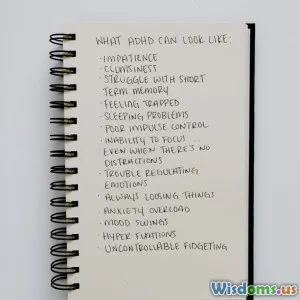
Why Setting Boundaries Is Critical to Emotional Well Being
7 min read Discover how setting personal boundaries empowers emotional health and nurtures self-worth. (0 Reviews)
Why Setting Boundaries Is Critical to Emotional Well-Being
Introduction
Imagine your emotional state as a garden. Without clear fencing or defined limits, anything—whether nourishing or toxic—can enter and influence its growth. Setting boundaries acts as that fence, defining where you end and others begin, protecting your emotional landscape from harm while allowing enriching experiences to flourish. But why exactly are these boundaries so fundamental to emotional well-being? In a world that constantly demands more of our time, energy, and attention, understanding and asserting limits is not just beneficial—it’s essential.
The Psychology Behind Boundaries
Boundaries are invisible lines that separate our physical, emotional, and mental space from others. Psychologically, they help establish a clear identity and foster healthy interactions. Dr. Henry Cloud, a renowned psychologist and author of Boundaries, explains that "boundaries define us; they define who we are and who we are not. They define what we are responsible for and what we are not."
Building a Sense of Self
Having clear boundaries contributes to a strong sense of self. It allows individuals to understand and respect their own limits, values, and needs. When we don’t set these boundaries, confusion about our identity can occur, often leading to feelings of vulnerability, resentment, or burnout.
Avoiding Emotional Overwhelm
A key role of boundaries is to prevent emotional flooding—the experience of being overwhelmed by others’ demands, emotions, or problems. In caregiving professions, for instance, research consistently shows that strong professional boundaries reduce burnout and compassion fatigue. Similar principles apply in personal relationships; boundaries act as a buffer that protects your emotional reserves.
Real-World Examples: Boundaries in Action
Consider James, a manager who often finds himself answering work emails at midnight because he never communicated his after-hours availability. Without boundaries, work time bleeds into personal time, reducing his ability to recharge emotionally.
Another example is Sara, who constantly prioritizes her friends’ needs over her own because she fears saying "no." Over time, Sara feels emotionally drained and unappreciated because her personal limits are unacknowledged.
Both scenarios highlight common boundary lapses that harm emotional well-being.
The Consequences of Weak or No Boundaries
When personal boundaries are unclear or absent:
- Increased Stress and Anxiety: Constantly accommodating others without limits can lead to chronic stress.
- Lowered Self-Esteem: Not asserting personal needs can foster feelings of worthlessness.
- Relationship Strain: Without boundaries, relationships can become one-sided or toxic.
A study published in the Journal of Counseling Psychology found that individuals who maintain strong interpersonal boundaries report higher life satisfaction and lower symptoms of depression and anxiety.
How to Set Boundaries Effectively
1. Identify Your Limits
The first step is self-reflection. What makes you uncomfortable? When do you feel overwhelmed or resentful? These emotions are signals indicating where boundaries are needed.
2. Communicate Clearly
Use direct and assertive language. For example, instead of vague hints, say, "I’m unable to take on more projects after 5 PM to ensure I have personal time."
3. Practice Saying No
This can be challenging but is crucial. Saying no respects your limits and communicates your priorities. You might say, "I can’t help with this now, but I appreciate you thinking of me."
4. Set Digital Boundaries
Managing screen time and online interactions is essential in today’s hyperconnected world. Setting "do not disturb" times or limiting social media usage protects emotional energy.
5. Seek Support When Needed
Therapists and support groups can provide guidance on boundary-setting skills, especially for individuals with complex emotional histories.
The Positive Impact of Healthy Boundaries
People who master boundary-setting often experience:
- Greater Emotional Resilience: Boundaries prevent emotional exhaustion by conserving mental energy.
- Improved Relationships: Clarity about needs fosters mutual respect and understanding.
- Enhanced Self-Respect: Standing up for oneself builds confidence.
Emmy, a nurse, reflects, "Setting boundaries allowed me to give my best at work without burning out. I feel more in control of my life and emotions."
Conclusion
Setting boundaries is far more than just saying no; it is an act of self-care and emotional stewardship. By defining our limits, we craft a protected space that nurtures our identity, mental health, and relationships. In our rapidly moving world, boundaries act as a stabilizing force—encouraging mindful engagement rather than reactive depletion. Take the step today to identify your boundaries, communicate them, and observe how your emotional well-being flourishes as a result.
Remember: Boundaries are not walls; they are bridges to healthier, more authentic connections—starting with the most important relationship you will ever have: the one with yourself.
References:
- Cloud, H., & Townsend, J. (1992). Boundaries: When to Say Yes, How to Say No to Take Control of Your Life. Zondervan.
- Kemper, K. J., Mo, X., & Khayat, R. (2016). Are self-care behaviors associated with nurse burnout?. Journal of Occupational and Environmental Medicine, 58(7), 614–622.
- Journal of Counseling Psychology, Boundary maintenance and mental health, 2018.
- Personal interview insights collected anonymously.
Rate the Post
User Reviews
Popular Posts





















